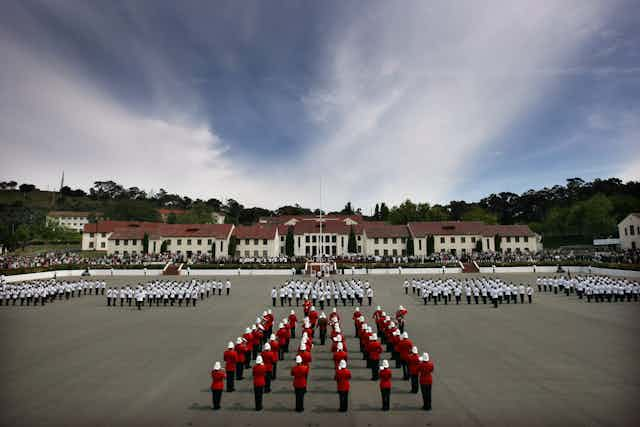How does one establish a plan to lure one of your female colleagues into a dormitory room for consensual sex, but unwittingly into the scope of a webcam for broadcast? How does it come to fruition? What provides the impetus to carry it out?
One word: culture.
Yesterday the Minister for Defence Stephen Smith released the DLA Piper Report of allegations of sexual and other abuse in defence to the public.
It is, for the most part, an incisive and detailed account of military culture. A portfolio of accounts of abuse, systemic dysfunction, a culture of non-reporting, and a massive failure of duty of care. All bound in a cloak of secrecy.
Band of brothers
The young men responsible for the Skype incident were colluding for the ritual of mateship and the embellishment of the self. It was an act of identification and of military performance.
It was an act of bonding: pleasing each other at the expense of their colleague. It was carried out in the tradition of “the trifecta” – where male cadets gain kudos for having sex with a female cadet from each service. In my time is was known as “gaining your wings”. Overwhelmingly, this is the rule of brothers in the defence force.
This is a force that incites young men to form groups to bash, sexually humiliate, rape, bastardise or abuse other men. It is the same imperative that underlies men watching pornography together, engaging in rituals of degradation, or consuming too much alcohol and playing up.
Brotherhood translates to male entitlement that underlines the rape and sexual harassment of women. When there is a failure to report, it is to a large extent because of fear or a failure to be listened to by those in command. When victims of abuse summoned the courage to report and were told to “suck it up” or adapt to reality, they experienced the closure of brotherhood: a culture of secrecy, denial, prevarication and distortion.
A culture of denial
Culture is a word of great contest in this affair. Commander after commander has attested, as scandal after scandal erupted, that there is no culture of abuse in the defence force.
There was apparently “no culture” in 1913 when the first scandal hit the newly formed Royal Military College at Duntroon. In his history of the college, Darren Moore described the behaviour that caused the scandal:
Upon emerging from the bathroom, the Fourth Class cadets had to climb a greasy rope, while the senior cadets flicked them with wet knotted towels.
At the time, Commandant General W.T. Bridges argued that it was the normal play of young people in universities.
There was “no culture” in 1969, when Military College academic Gerald Walsh explained that hazing, initiations and the systemic abuse of junior class cadets was dangerous and detrimental to cadet learning.
There was “no culture” when bastardisation hit the headlines in 1992, and was described by the army media spokesperson as “just the rough and tumble of normal universities”.
And there was “no culture” when the Skype incident became public last April. Then Chief of the Defence Force Angus Houston argued:
If you draw comparisons against similar institutions - I am talking about university campuses - I think the number of incidents of this kind is less at ADFA than any other campus in the country …
But the defence force cannot deny its culture any more.
If anything has shifted in this last raft of reviews it is this point. There is a culture. Acknowledging the problem is the first step to resolution.
The DLA Piper Report is at pains to articulate this in a way that no report has done before. The authors make the point with some labour.
Beyond sex and violence
There were around 1300 submissions to the DLA Piper review, and around 800 were deemed plausible or within the terms of reference. The review is a partial account of some victims willing to talk this time about sexual harassment and physical violation. For all we know, it may only be scratching the surface in this regard.
But defence culture goes deeper than sexual abuse. It underlies how people see themselves and others: how they interact.
The DLA Piper review’s terms of reference failed to follow up on a series of associated abuses: unfair dismissals, the grief of families deprived of information about their lost child, the closed and parochial character of defence investigations, the opprobrium for talking about illegal or immoral practices, the failure to maintain the obligations of public service across the ranks, accommodating unlawful behaviour such as fraud, distotion or lies. Why stop at sex and violence?
The need for a Royal Commission
So it remains that while all the reviews have been thorough and with many useful outcomes and recommendations, they have only revealed the tip of the iceberg. Any further action must have further reaching investigative powers.
A Royal Commission is clearly the strongest mechanism for this.
Royal Commissions are trials of stamina for the victims, who are once again called upon to steel against their trauma and publicly account for their grief. But publicity offers transparency and accountability, something the ADF has been, and remains, shy of.
A Royal Commission or judicial inquiry places this tragic saga on the public record with authority, opening a bad sore to the fresh air. Reconciliation, acknowledgement and public apologies offer personal salve. Compensation is a pillar of any option.
The DLA Piper review has opened a box from which many difficult decisions spring forth. One can be cynical toward the cycle of reviews, pessimistic for change. While the focus on defence culture has changed, and the command is only just “getting it”, there will be resistance as the message spreads down through the ranks from commanding officers to local command. For the ADF the work is only just beginning in earnest.

